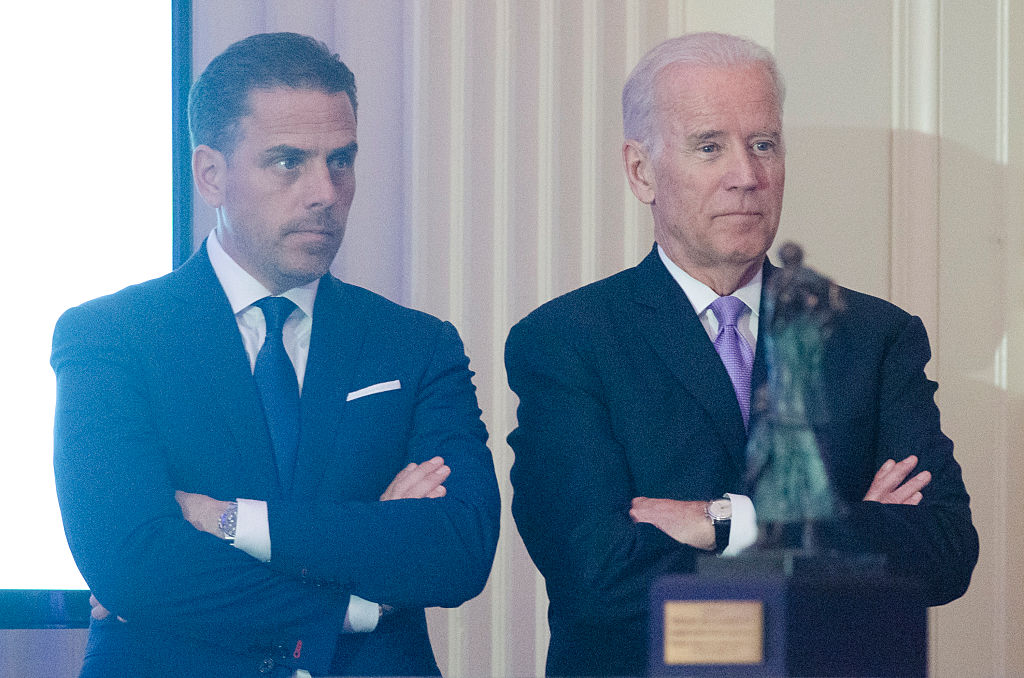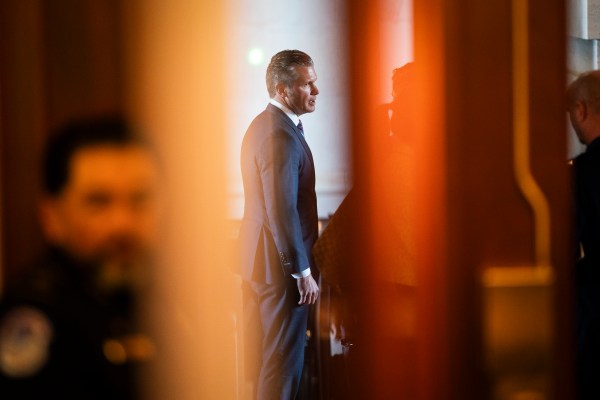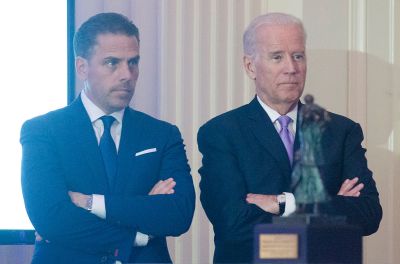Happy Wednesday! The Dispatch softball team had a game last night, and, because we’re telling you about it, you can safely assume we won.
Also, please give a warm TMD welcome to our intern for the summer: Jacob Wendler is joining us from Northwestern University, and we’re thrilled to have him on the team for the next few months.
Quick Hits: Today’s Top Stories
- Hunter Biden reached a plea deal with federal prosecutors in Delaware, court filings showed Tuesday. The president’s son will plead guilty to two misdemeanor federal counts for failure to pay taxes in 2017 and 2018, while prosecutors consented to a “pretrial diversion agreement” for a charge of illegal possession of a firearm, meaning Biden must meet certain conditions under the deal before the gun charge is removed from his record. Delaware U.S. Attorney David Weiss said the investigation into Biden is “ongoing,” suggesting additional matters beyond the tax and firearm charges may be included in the probe first opened in 2018. The deal must be approved by a federal judge.
- Florida District Judge Aileen Cannon set an August 14 trial date in the criminal case against former President Donald Trump over his alleged mishandling of classified documents and obstruction of justice. That aggressive timeline will likely be pushed back, however, by pre-trial motions from Trump’s legal team and security clearance investigations—which can take months—for lawyers in the case who need to view classified documents that are evidence in the trial.
- The Pentagon announced Tuesday that an accounting error led the U.S. government to overestimate the cost of military aid to Ukraine by $6.2 billion. The Department of Defense revealed the error—caused by counting items’ replacement costs instead of their depreciated value—last month but initially estimated the miscount at only $3 billion. The Pentagon said it will use the extra funds to send Ukraine more aid.
- A federal judge on Tuesday struck down a 2021 Arkansas law prohibiting gender transition medical treatments for minors. Several other GOP-led states, including Texas and Florida, have enacted similar laws, and a judge in Indiana on Friday temporarily blocked that state’s law from going into effect. Arkansas’ Republican Attorney General Tim Griffin said he plans to appeal the judge’s ruling.
- One of three Chinese scientists who became sick with an unknown illness during the initial COVID-19 outbreak was reportedly funded by the U.S. government and studying coronaviruses at the Wuhan Institute of Technology. Researcher Ben Hu presented COVID-like symptoms when he and the other scientists became sick in November 2019, lending credence to the theory that the virus may have leaked from a lab. The intelligence community remains divided on COVID-19’s origin, with two agencies concluding it may have come from a lab and four (plus the National Intelligence Council) attributing transmission from animals—though none of the agencies have a high level of confidence in their assessments.
- The Wall Street Journal reported Tuesday that China and Cuba are negotiating the installation of a joint military training facility on the northern coast of the island. The Biden administration has reportedly been in contact with Havana to voice opposition to the planned base, which could pave the way for Chinese troops to be permanently stationed roughly 100 miles from the U.S. mainland. Yesterday’s report followed confirmation of a Chinese listening station on the island.
- The Justice Department notified banks Tuesday that, following years of corporate consolidation in the financial sector, it plans to begin scrutinizing bank mergers more intensely. The updated antitrust review process will cover factors like interest rates, fees, and customer service, with Assistant Attorney General for Antitrust Jonathan Kanter saying yesterday the agency’s current focus on “local market deposit concentration” is inadequate.
- The State Bar of California began disbarment proceedings Tuesday against John Eastman, the Trump-aligned lawyer who wrote a memo arguing former Vice President Mike Pence had the authority to overturn the results of the 2020 presidential election. Eastman is facing 11 disciplinary charges related to his election scheme, and if the State Bar decides against Eastman, it may recommend his law license be suspended or revoked. The final decision, however, would be up to California’s Supreme Court.
- Fox News announced Tuesday that chief political correspondent Bret Baier and daytime host Martha MacCallum will co-moderate the first Republican presidential primary debate, to be held at Milwaukee’s Fiserv Forum on August 23. To qualify for the debate stage, candidates must meet the Republican National Committee’s strict fundraising and polling requirements—in addition to complying with the RNC’s controversial loyalty pledge—by August 21.
There’s Hunter

Two weeks ago, President Trump was indicted on 37 criminal counts related to his retention of classified documents. Yesterday, the son of the current president reached a plea deal with the Justice Department over tax and firearm charges. Surely lawmakers and pundits on both sides of the aisle will dive into the complex set of facts surrounding each case and assess the disparate outcomes independently and on the merits.
The plea agreement—revealed Tuesday morning by a federal court filing in Delaware—marks a significant milestone in the long-running investigation into Hunter Biden’s financial activities, international business dealings and tawdry behavior, but the political ramifications of the First Son’s behavior are yet to be determined. Coming on the heels of Trump’s unprecedented federal indictment, yesterday’s deal—which will likely keep Hunter out of jail—had Republicans up in arms and vowing to continue their own various investigations into the so-called “Biden Crime Family.”
The Justice Department’s investigation into Hunter Biden dates back nearly five years, and has been led by David Weiss, the U.S. Attorney in Delaware who was recommended by the state’s two Democratic senators, nominated by former President Trump, and confirmed via voice vote by a Republican-controlled Senate. Presumably for appearances’ sake, he was one of just two Trump-era U.S. attorneys Biden didn’t ask to resign at the outset of his term.
Weiss’ probe included allegations of foreign lobbying, influence peddling, and money laundering, but it reportedly narrowed last fall to focus on the aforementioned tax and firearm charges. Yesterday, Weiss announced charges and a plea agreement centered on those crimes. “Hunter Biden is charged with two violations of failure to pay income tax and one violation of unlawful possession of a firearm by a person prohibited,” a statement from Weiss’ office said yesterday. “If convicted, he faces a maximum penalty of 12 months in prison on each of the tax charges and a maximum penalty of 10 years in prison on the firearm charge.”
Under the terms of his deal, however, Hunter is unlikely to spend even one day behind bars. He agreed to plead guilty to two misdemeanors for failing to pay tax bills “in excess of” $100,000 in both 2017 and 2018—resulting in probation—and he consented to entering a diversion program (similar to probation) to deal with a felony firearm offense related to his gun ownership while being an active drug user. He will reportedly need to stay sober 24 months and forgo guns for life to abide by the parameters of the diversion program—though a judge still needs to sign off on any plea deal before it can go into effect.
A statement from the White House expressed relief with yesterday’s outcome. “The President and First Lady love their son and support him as he continues to rebuild his life,” a spokesperson said. “We will have no further comment.”
“I know Hunter believes it is important to take responsibility for these mistakes he made during a period of turmoil and addiction in his life,” Chris Clark, Hunter’s attorney, said yesterday. “With the announcement of two agreements between my client, Hunter Biden, and the United States Attorney’s Office for the District of Delaware, it is my understanding that the five-year investigation into Hunter is resolved.”
Depends who you ask.
Weiss on Tuesday issued a fairly boilerplate statement announcing the charges—but concluded by saying “the investigation is ongoing.” Whether that aside was simply pro forma or it referred to another line of inquiry separate from the tax and gun charges was not clear as of Wednesday morning.
GOP Rep. James Comer—chair of the House Oversight Committee—requested clarity yesterday (whether an investigation is “ongoing” or not has implications for Congress’ ability to request related documents), but Republican lawmakers and GOP-aligned legal pundits made clear that they’re not satisfied with the outcome so far. “The plea agreement looks like rushing to the scene of a bank robbery and giving the getaway driver a ticket for double parking,” Jonathan Turley—a George Washington University law professor—argued Tuesday. “[Hunter] will plead to a couple of misdemeanors on tax violations without addressing how he actually made this money.”
As a businessman, Hunter’s greatest asset is his last name, and he’s cashed in on it repeatedly in recent years, raking in millions. Revelations from disclosures of once-private texts and emails show Hunter Biden consistently and shamelessly using his family name to open doors and advance his business interests.
Republicans remain focused on sniffing out Hunter’s foreign business dealings and any misconduct that implicates the president. The House Oversight investigation revealed last month dubious financial ties between members of the Biden family (not including the president) who received millions in payments from foreign sources including companies in Ukraine and China. Hunter worked as a legal advisor to a Romanian businessman under investigation for corruption, served on the board of directors for Ukrainian energy company Burisma Holdings and provided consulting and legal services to CEFC China Energy—CEFC’s founder even gave Hunter an $80,000 diamond.
Republican lawmakers and conservative commentators have lambasted the agreement as a “sweetheart deal,” highlighting the lack of prison time. Comer described the deal as a “slap on the wrist” and lamented a “two-tiered system of justice.” House Speaker Kevin McCarthy said: “If you are the president’s leading political opponent, the DOJ tries literally to put you in jail and give you prison time. If you are the president’s son, you get a sweetheart deal.”
But legal observers argue the deal is not necessarily outside the sentencing norm. “Pleading out a tax case to misdemeanor counts of willful failure to file is not terribly unusual pre-indictment,” Ken White, a criminal defense attorney and former federal prosecutor, tells TMD. White also describes the gun charge as “really, really rarely prosecuted, and mostly prosecuted when they’re going after someone for something else.”
“To evaluate just how sweet a deal it is, I’d want more information—like how much tax was evaded and what are the circumstances,” he added. “But nothing about it screams this was super unusual treatment.” The exact details of the agreement and the investigative findings that underlie it have yet to be released.
One thing that likely helped: working with prosecutors. Hunter’s legal team, led by attorney Chris Clark, has been cooperating with the Justice Department for months.“You get a better deal if you plead, and you get a significantly better deal if you plead pre-indictment,” White tells TMD.
Unlike Hunter, Trump allegedly tried to steamroll the investigation into his handling of classified documents, against the recommendation of some of his attorneys. Christopher Kise, a member of Trump’s legal team, suggested last fall the president try to settle the case with the Justice Department to avoid charges. Instead of cooperating, Trump apparently misled his own attorneys in an effort to keep boxes of classified material—not exactly the best recipe for success when trying to avoid federal charges. Trump pleaded not guilty to all 37 charges last Tuesday.
Worth Your Time
- Behind every AI-generated piece of information is a mass of people who fed it data and told it what that data was. For New York Magazine, Josh Dzieza reports on all the jobs AI is creating as it replaces scores of others. “AI learns by finding patterns in enormous quantities of data, but first that data has to be sorted and tagged by people,” Dzieza writes. “Annotation remains a foundational part of making AI, but there is often a sense among engineers that it’s a passing, inconvenient prerequisite to the more glamorous work of building models. You collect as much labeled data as you can get as cheaply as possible to train your model, and if it works, you no longer need the annotators. But annotation is never really finished. Machine-learning systems are what researchers call ‘brittle,’ prone to fail when encountering something that isn’t well represented in their training data. These failures, called ‘edge cases,’ can have serious consequences. In 2018, an Uber self-driving test car killed a woman because, though it was programmed to avoid cyclists and pedestrians, it didn’t know what to make of someone walking a bike across the street. The more AI systems are put out into the world to dispense legal advice and medical help, the more edge cases they will encounter and the more humans will be needed to sort them.”
Presented Without Comment
Mediaite: Trump Explains Why He Doesn’t Mention Vaccines: ‘As a Republican, It’s Not a Great Thing to Talk About’
Also Presented Without Comment
RealClearNews: “When asked how he differs from DeSantis and Trump, Sen. Tim Scott [replies] ‘the first thing I’d say’ is that ‘I do care who wins the Ukrainian conflict.’”
Toeing the Company Line
- Did Sarah get a tattoo? What should we make of the Hunter Biden plea deal? What does it mean for the GOP presidential primary race? Mike and Andrew joined Sarah and Jonah to discuss all that and more on last night’s Dispatch Live (🔒). Members who missed the conversation can catch a rerun—either video or audio-only—by clicking here.
- In the newsletters: Haley covers censure proceedings against Adam Schiff and Republican lawmakers’ reaction to Blinken’s Beijing trip, Sarah checks in on (🔒) the 2024 GOP primary candidates with tales from the campaign trail, and Nick explains (🔒) how Hunter Biden’s plea deal creates a unique opportunity for Trump.
- On the podcasts: Stephanie Slade joins Jonah on The Remnant for a deep dive into Patrick Deneen’s new book and the strange world of the new right, while David and Sarah discuss the Hunter Biden plea deal, last week’s Supreme Court rulings, and ice cream in a live audience edition of Advisory Opinions.
- On the site today: Jonah urges readers to drop the nostalgia act, and Scott Winship and Jeremy Horpedahl argue against the economic doomerism espoused by leading national conservative voices.
Let Us Know
How confident are you that Hunter Biden would have received the same plea deal if his last name was Jones? What would you need to see to be 100 percent confident?








Please note that we at The Dispatch hold ourselves, our work, and our commenters to a higher standard than other places on the internet. We welcome comments that foster genuine debate or discussion—including comments critical of us or our work—but responses that include ad hominem attacks on fellow Dispatch members or are intended to stoke fear and anger may be moderated.
With your membership, you only have the ability to comment on The Morning Dispatch articles. Consider upgrading to join the conversation everywhere.